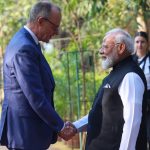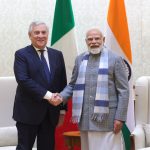It’s a celebration of the power and beauty of words. The power of words to transform and transfigure the world we live in. In its sixth outing, the Jaipur Literary Festival has grown bigger, better and more varied. For the next five days, poetry will intersect with polemics, faith will collide with skepticism, post-modernism will tease the so-called common readers, liberals will take on right-wingers and entertainers will jostle for space with high-brow auteuers.
The creative sparks flew in the sprawling Diggi Palace as the JLF began with Buddhist chants and the sagely words of Mahashweta Devi who spoke movingly about “Talking, Writing.” In a speech evocatively titled ‘O to Live Again,’ Mahasweta Devi said: “My early years proved to be formative for my future work as a writer and activist. I also have different approach to my writing process and I mull over the subjects in depth before setting out on the creative journey.”
Exuding a deep-down empathy for the “culture of the downtrodden,” Mahasweta Devi referred to the simple dreams of simple people in her speech. She called for the “right to dream” to be the first fundamental right of all human beings.

It may sound like a florid PR spiel, but the JLF, as the converted call it, has morphed into a Mahakumbh of sorts, offering not spiritual salvation, but a redemptive entertainment of the mind.
This year round, the list of invited authors is as eclectic as it can get. To name some star attractions randomly, Mahashweta Devi, Pico Iyer, Simon Armitage, Howard Jacobson, Zoe Heller.. and you get a sense of the stunningly varied spread on the offer. Also, this year’s list features a sprinkling of critics, philosophers and historians who will perhaps evoke yawns among literary voyeurs (and there are plenty of them swarming in there), but will be rare treat or the initiated and the well-versed. The non-fiction list is indeed impressive: Frank Dilotter, the biographer of Mao; Orlando Figes, a chronicler of Stalin’s purges; and Indian critics Homi Bhabha and Gayatri Chkaravarti Spivak, rock stars in the rarefied world of academia.
The burgeoning popularity and the sheer size of the JLF have even taken the organizers by surprise. “From only 14 guests turning up in 2005, most of whom were tourists who took the wrong turn, in 2006 we had a big enough crowd to nearly fill the Diggi Dubrar Hall. About 400 people came in 2007. Last year, we had 120,000 footfalls…,” says novelist William Dalrymple, also a director of the JLF.
Author Profile

- Manish Chand is Founder and Editor-in-Chief of India Writes Network (www.indiawrites.org) and India and World, a pioneering magazine focused on international affairs. He is CEO, Centre for Global India Insights, an India-based think tank focused on global affairs.
Latest entries
 India and the WorldFebruary 2, 2026Trump announces trade deal with India, Modi ‘delighted’
India and the WorldFebruary 2, 2026Trump announces trade deal with India, Modi ‘delighted’ India and the WorldJanuary 31, 2026Palestinian minister bats for mediatory role for India in ending Gaza conflict
India and the WorldJanuary 31, 2026Palestinian minister bats for mediatory role for India in ending Gaza conflict India and the WorldJanuary 13, 2026India, Germany raise the bar for defence, economic ties
India and the WorldJanuary 13, 2026India, Germany raise the bar for defence, economic ties India and the WorldDecember 12, 2025India-Italy bonding: Tajani’s visit raises the bar for business, maritime ties
India and the WorldDecember 12, 2025India-Italy bonding: Tajani’s visit raises the bar for business, maritime ties







